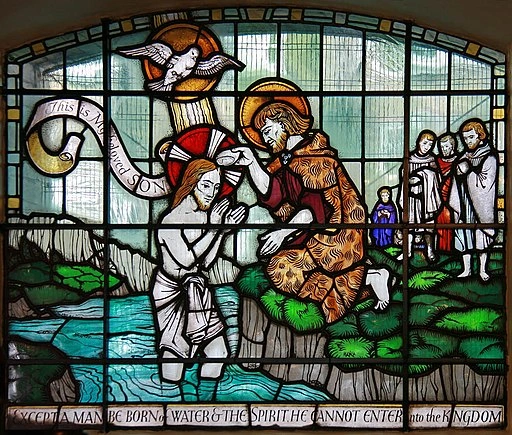Lukáš 3:21 : Jesus Prays at His Baptism
Jesus Prays at His Baptism
Ngu New Christian Bible Study Staff

Jesus Prays at His Baptism
Luke 3:21, 22: "And it came to pass when all the people were baptized, and when Jesus, having been baptized, was praying, that heaven was opened, and the Holy Spirit descended in a bodily appearance like a dove upon Him, and there was a voice from heaven, saying, “Thou art My beloved Son; in Thee I am well pleased.”
Although this episode is also reported in Matthew and Mark, the Gospel of Luke is the only one which mentions that Jesus prayed during His baptism. This emphasis upon prayer in Luke is consistent with the premise that a major theme of this gospel is the reformation of our understanding—the part of our mind that is focused on learning truth, having faith, and communing with God in prayer.
The beautiful words, “heaven was opened,” suggest that a revelation took place as Jesus prayed, a revelation which found expression in the divine utterance: “You are My beloved Son; in You I am well pleased” (Luke 3:22).
This episode speaks to each of us of the importance of prayer in our lives. These are the times when we turn inward in search of the Father, listening for guidance, instruction, comfort, inspiration, and revelation. This process of turning inward in search of that which is deeply spiritual is essential. Without it, our efforts to serve others will be based on the weak and crumbling foundation of our own self-hood. We should never let our egos interfere with the great work the Lord wants to do through us. In prayer, we quiet the inner chatter, we enter the stillness, we speak to God and listen for the divine response. As it is written in the Hebrew scriptures, “Be still and know that I am God” (Psalm 46:10).
“The Lord is in His holy temple; let all the earth be silent before Him” (Habakkuk 2:20).
To silence “the earth” is to temporarily put aside the cares of the external world while resting in God. In brief, it is the endeavor to silence the voice of the ego long enough to hear the voice of God. This is at the heart of a contemplative life. 1
Before beginning any vital work, the first step is to begin with prayer. Jesus’ baptism in Luke captures this idea beautifully. Jesus was about to begin His public ministry. But before the heavens could be opened to Him, before the revelation and the inspiration could come, Jesus needed to take that first crucial step. He needed to pray: “And while He prayed, heaven was opened.” It was only then that He was ready to begin His public ministry. As it is written, “Jesus Himself began His ministry at about thirty years of age”.
Teachings like these remind us of how important it is to precede action with contemplation, and precede public service with private devotion. While ministry and service are noble ends, they must be filled with the wisdom of spiritual purpose. Behind every successful, worthwhile action is a life grounded in contemplation and prayer. 2
Imibhalo yaphansi:
1. See Arcana Coelestia 2535: “Praying is nothing else than internal speech with the Divine, and at the same time revelation.” See also Arcana Coelestia 636: “The ‘earth’ signifies self-love and whatever is contrary to heaven.”
2. The idea that prayer should precede action is beautifully illustrated in the following passage about “Charity in the Common Soldier”: “Before the battle he raises his mind to the Lord, and commits his life into His hand; and after he has done this, he lets his mind down from its elevation into the body and becomes brave; the thought of the Lord—which he is then unconscious of—still remains in his mind, above his bravery. And then if he dies, he dies in the Lord; if he lives, he lives in the Lord” (Charity 166).
Charity #165
165. Charity in the case of Officers under the Commander of an Army.
They can each one become a charity, that is, an angel of heaven, if they look to the Lord and shun evils as sins, and carry out the duties of their command honestly, justly, and faithfully. For in this way they, too, are constantly doing the goods of use that are of charity; for their minds are in them, and when the mind is constantly in goods of use, it becomes a form of charity. For each one, his country is the neighbour; in a spiritual idea he is the protection of it, and its security from invasion and destruction. He is not triumphant with false claims of what he has not merited; nor is he triumphant over what he has merited: he thinks the latter is his duty, and this makes him contented in spirit and not boastful. In war he loves the soldiers under him, according to their activity, honesty, and obedience; he looks after them, and wishes well to them as to himself, they being victims in the glory he has from his use. For officers can have a glory from their use and a glory from their rank. Those who are charities have a glory from their use, but not from their rank. The other things in his case are similar to those in the case of the commander of an army, already treated of, differing only in accordance with the extent of his command. I have seen such officers in a higher heaven; and I have seen officers who were not such, in hell.






